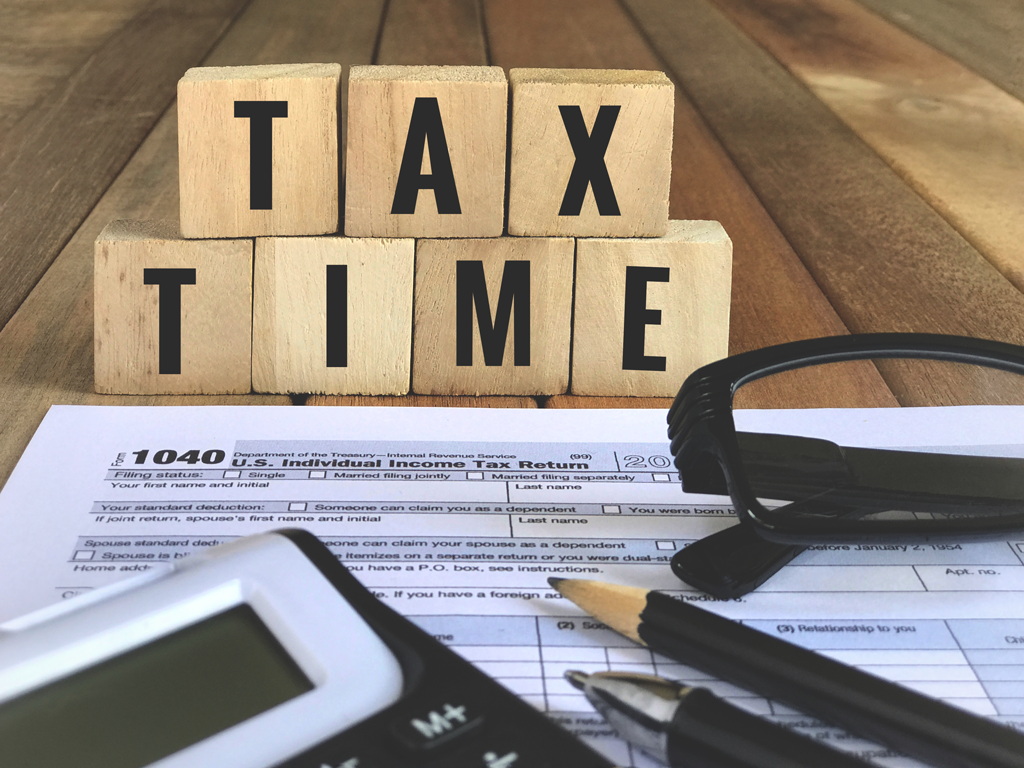
With the change in seasons, many are busy making summer travel plans. But don’t forget – there is an important deadline between now and then – April 18, the tax filing deadline. Whether you’re preparing your own taxes or seeking professional assistance, there’s some work to be done. Some COVID-era tax changes might also add to the task. The good news is there are resources to help! Here’s some guidance on what you need to know and where to get additional support to prepare.
Tax Prep Documents
Documentation needed to complete your taxes falls into two broad categories: income and expenses. Some of the most commonly used documents are listed below. However, please note that there are many more tax categories of income and expenses not covered here. Visit the resources listed below for more information.
Common Income Forms
- Form W-2: This is the wage and tax statement from your employer.
- Form 1099: This form covers other income, including interest income, self-employment income, unemployment compensation, dividends, real estate sale proceeds, retirement account distributions, and Social Security benefits, to name a few.
Common Expense Forms
- Form 1098: This form covers interest paid on loans, such as mortgage interest and student loan interest, and tuition paid for higher education.
- Child care expenses: Your provider should give you a summary of these expenses.
- Business expenses: If you are self-employed, you may be able to deduct your business expenses.
COVID-era Impacts
- Watch for IRS letters about advance Child Tax Credit (CTC) payments and the third Economic Impact Payment.
- Eligible taxpayers who received advance CTC payments should file a 2021 tax return to receive the second half of the credit. Eligible taxpayers who did not receive advance CTC payments can claim the full credit by filing a tax return. People who received the advance payments can also check the amount of the payments they received by using the CTC Update Portal.
- The IRS will mail letters regarding the third Economic Impact Payment to individuals who received a third payment in 2021. While most eligible people already received their stimulus payments, this letter will help individuals determine if they are eligible to claim the Recovery Rebate Credit for missing stimulus payments. If so, they must file a 2021 tax return to claim their remaining stimulus amount. People can also access their IRS online account to view their Economic Impact Payment amounts.
Special Provisions for Military Members and Spouses
Did you know that if your spouse deployed to a combat zone, qualified hazardous duty area, or an area that DoD has certified as a direct support area in 2021, his or her pay while deployed in those areas (partial months in area count as full months) is not subject to federal income tax? This is called the Combat Zone Tax Exclusion (CZTE) and should be automatically excluded on their W-2. Check out MilSpouse Money Mission: Pre-Deployment for more information.
Also, if your family experienced a permanent change of station (PCS) last year, some of your unreimbursed moving expenses may be deductible. So, be sure to take out, organize, and tally up those receipts!
The IRS provides comprehensive tax information for Service members. Additionally, the Military Spouse Residency Relief Act allows military spouses to maintain legal residence in the state where they lived before a PCS with their active-duty Service member. Learn how this act might affect your tax filing status.
Tax Prep Help Is Standing By
Taxes can be a challenging topic, especially for members of the military. The good news is that you do not have to figure them out on your own. Military OneSource MilTax provides FREE tax services including tax prep and e-filing software. They have you covered with personalized support addressing the needs of military life.
You can also access free tax filing software and make an appointment to speak with a trained tax consultant at a Volunteer Income Tax Assistance Program (VITA) site on or near your installation. VITA centers provide free, in-person consultation and tax preparation services for military families. Click here to find a VITA location near you.
Every family’s tax situation is unique. Seek advice from a professional or visit the resources listed above for more information. Head toward that tax filing deadline with confidence! If you’re expecting a refund, you should consider allocating all or a portion toward that summer trip you may be planning or another financial goal. Visit MilSpouse Money Mission to help you make smart money moves.
 MilSpouse Money Mission® is a Department of Defense resource that offers FREE personal financial education specifically geared toward spouses. There is a Money Ready guide for various stages of financial life, a MilLife Milestones section to help you through the big moments in your military journey, a blog, spouse videos, quizzes, calculators and more!
MilSpouse Money Mission® is a Department of Defense resource that offers FREE personal financial education specifically geared toward spouses. There is a Money Ready guide for various stages of financial life, a MilLife Milestones section to help you through the big moments in your military journey, a blog, spouse videos, quizzes, calculators and more!
MilLife Milestones
Personality Quiz

Next Blog

With the change in seasons, many are busy making summer travel plans. But don’t forget – there is an important deadline between now and then – April 18, the tax filing deadline. Whether you’re preparing your own taxes or seeking professional assistance, there’s some work to be done. Some COVID-era tax changes might also add to the task. The good news is there are resources to help! Here’s some guidance on what you need to know and where to get additional support to prepare.
Tax Prep Documents
Documentation needed to complete your taxes falls into two broad categories: income and expenses. Some of the most commonly used documents are listed below. However, please note that there are many more tax categories of income and expenses not covered here. Visit the resources listed below for more information.
Common Income Forms
- Form W-2: This is the wage and tax statement from your employer.
- Form 1099: This form covers other income, including interest income, self-employment income, unemployment compensation, dividends, real estate sale proceeds, retirement account distributions, and Social Security benefits, to name a few.
Common Expense Forms
- Form 1098: This form covers interest paid on loans, such as mortgage interest and student loan interest, and tuition paid for higher education.
- Child care expenses: Your provider should give you a summary of these expenses.
- Business expenses: If you are self-employed, you may be able to deduct your business expenses.
COVID-era Impacts
- Watch for IRS letters about advance Child Tax Credit (CTC) payments and the third Economic Impact Payment.
- Eligible taxpayers who received advance CTC payments should file a 2021 tax return to receive the second half of the credit. Eligible taxpayers who did not receive advance CTC payments can claim the full credit by filing a tax return. People who received the advance payments can also check the amount of the payments they received by using the CTC Update Portal.
- The IRS will mail letters regarding the third Economic Impact Payment to individuals who received a third payment in 2021. While most eligible people already received their stimulus payments, this letter will help individuals determine if they are eligible to claim the Recovery Rebate Credit for missing stimulus payments. If so, they must file a 2021 tax return to claim their remaining stimulus amount. People can also access their IRS online account to view their Economic Impact Payment amounts.
Special Provisions for Military Members and Spouses
Did you know that if your spouse deployed to a combat zone, qualified hazardous duty area, or an area that DoD has certified as a direct support area in 2021, his or her pay while deployed in those areas (partial months in area count as full months) is not subject to federal income tax? This is called the Combat Zone Tax Exclusion (CZTE) and should be automatically excluded on their W-2. Check out MilSpouse Money Mission: Pre-Deployment for more information.
Also, if your family experienced a permanent change of station (PCS) last year, some of your unreimbursed moving expenses may be deductible. So, be sure to take out, organize, and tally up those receipts!
The IRS provides comprehensive tax information for Service members. Additionally, the Military Spouse Residency Relief Act allows military spouses to maintain legal residence in the state where they lived before a PCS with their active-duty Service member. Learn how this act might affect your tax filing status.
Tax Prep Help Is Standing By
Taxes can be a challenging topic, especially for members of the military. The good news is that you do not have to figure them out on your own. Military OneSource MilTax provides FREE tax services including tax prep and e-filing software. They have you covered with personalized support addressing the needs of military life.
You can also access free tax filing software and make an appointment to speak with a trained tax consultant at a Volunteer Income Tax Assistance Program (VITA) site on or near your installation. VITA centers provide free, in-person consultation and tax preparation services for military families. Click here to find a VITA location near you.
Every family’s tax situation is unique. Seek advice from a professional or visit the resources listed above for more information. Head toward that tax filing deadline with confidence! If you’re expecting a refund, you should consider allocating all or a portion toward that summer trip you may be planning or another financial goal. Visit MilSpouse Money Mission to help you make smart money moves.
 MilSpouse Money Mission® is a Department of Defense resource that offers FREE personal financial education specifically geared toward spouses. There is a Money Ready guide for various stages of financial life, a MilLife Milestones section to help you through the big moments in your military journey, a blog, spouse videos, quizzes, calculators and more!
MilSpouse Money Mission® is a Department of Defense resource that offers FREE personal financial education specifically geared toward spouses. There is a Money Ready guide for various stages of financial life, a MilLife Milestones section to help you through the big moments in your military journey, a blog, spouse videos, quizzes, calculators and more!
MilLife Milestones
2019 Tax Prep: Back to Basics
It’s tax time again. And while the federal income tax filing deadline for 2019 has been extended to…
Read MorePersonality Quiz





